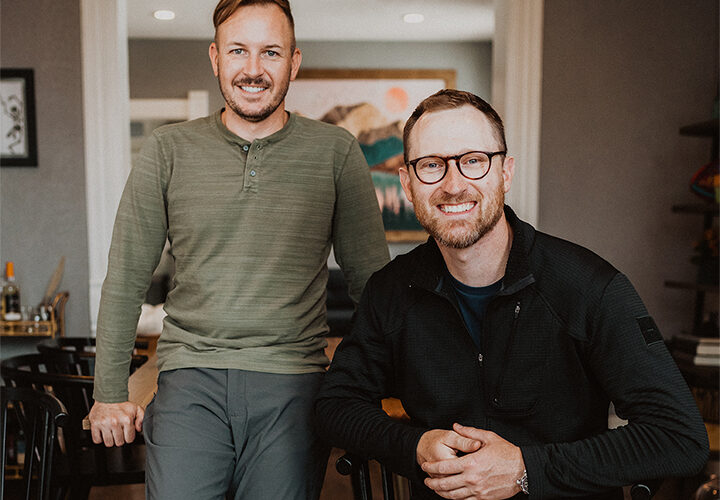BY MARISSA KOZMA
At Ancillary K9, mastering the art of training man’s best friend is second nature to trainers Dion and Tyler. From teaching basic commands to solving aggressive behavior, Ancillary K9 helps pet owners train their dogs using methods that work. They also bust the myth that you can’t teach an old dog new tricks. We had the pleasure of learning more about their innovative approach.
How did you start Ancillary K9 and embark on this journey together?
T: Like so many of our clients, I ended up with a difficult dog — a dog I loved more than anything — but his bad behavior eventually got me to the point where I almost didn’t like him anymore. However, I was never willing to give up. So on that path, I took him to several different dog trainers.
I met with about six of them and finally discovered methods that actually worked and helped me teach him good obedience and rebuild our relationship. Dion had a similar situation with a tough dog and we both realized we had a knack for the training process.
Dion founded Ancillary K9 and we started helping other dog owners with similar problems. Since I joined the business, it’s been one of my most enjoyable experiences.
D: I also went through a handful of trainers because I had a dog they could not or would not work with. I finally found excellent mentors and started incorporating their philosophy, and eventually developed my own personalized approach that worked. I realized I wanted to help people in similar situations to feel as confident about training their dog as I was.
It sounds like you both have a true understanding of the way dogs think. Was this a talent you’ve always had or did it come from years of experience?
D: I think there are dog people and then there are dog owners. I’ve always been an animal person and feel very comfortable working with them. Over the years, my training philosophy has evolved after every client since no two dogs are exactly the same. Through trial and error, Tyler and I always get to the root of the problem, so in that way, we’ve always been pretty good at reading dogs.
T: I agree. I’ve always felt very comfortable around dogs. I definitely consider myself a dog person, and I also understand what it takes to train them. Owning a dog is a lot of hard work and it takes a while to learn what specifically works for your pet.
What training services do you provide?
D: I specialize in obedience training — from moderate to severe behavioral problems to aggressive-dog rehabilitation. We offer personal protection training with select dogs as well as scent work or tracking. I also see a fair number of clients in need of court-ordered evaluations and training.
T: I handle the in-home training for Ancillary K9. I teach everything from basic obedience, to how to handle mild to severe behavioral problems. I also do a lot of foundational training with puppies to prevent them from developing behavioral problems in the first place. My mission is to shape a well-behaved family dog that pet owners feel confident bringing to restaurants with a patio or to the park.
D: I think a lot of people think of us as aggressive-dog specialists and oftentimes our clients find us when things are pretty bad. But it would be nice for some of our clients to find us before things get to that point! We can definitely help if you notice there might be a problem.
It’s extremely uncommon to find someone living in Denver who isn’t a dog owner. That being said, not all dogs get proper training. Is there any truth behind the famous saying,“You can’t teach an old dog new tricks?”
T: While it’s nice to catch things before they get bad, you can certainly train your dog at any age. I’ve worked with older dogs that are 10-12 years old and have developed behavioral issues throughout their life. But it’s never too late to fix those things.
D: I also see a lot of clients with older dogs, and what I find is that with clear, direct communication and a solid training philosophy, older dogs are actually quite malleable. It’s not much different than, say, you or me deciding to go back to school to get another degree or making a career change. Dogs can always learn new things. I think the biggest hurdle with training an older dog is that the owners themselves have established some bad habits. It’s harder to get an owner to change the way that they think of things and the way that they approach their dog, but dogs are actually quite amenable to training at any age.
Most people might benefit from sending in questions about their dogs before settling on a specific training plan. Is this something you would welcome?
D: Of course! We’re launching an “Ask the Dog Trainer” series in which owners can directly email us their questions. We also offer free phone consultations for anybody considering our services. We will talk about your goals for training and any specific problems you’d like addressed. Then we recommend a personalized training program to meet those goals. We’re always happy to have people reach out with questions.
When you’re not training, how do you both spend your free time?
T: I like the outdoors. I enjoy backpacking, camping, and spending time with my dogs. My wife and I have two dogs and we try to get outside with them as much as possible.
D: I also love being outdoors with my fiancé and my dog. We like traveling and working on projects around the house. We also just built a chicken coop!
Dion and Tyler have graciously offered to answer your toughest dog training questions. Visit them at ancillaryk9.com or email them at info@ancillaryk9.com

